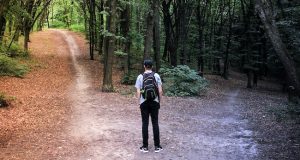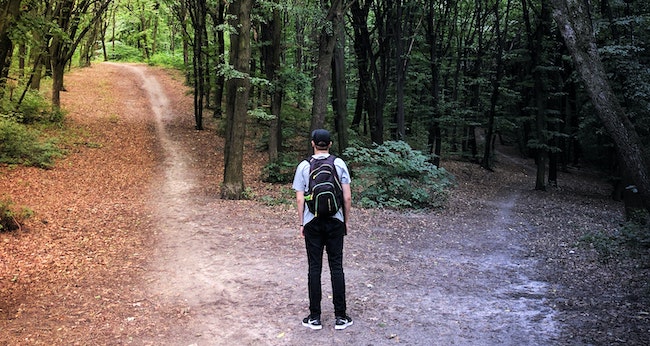
Our reading this week begins, “See I have placed before you today blessing and curse. The blessing, if you listen to the Commandments of Hashem your G-d, which I have Commanded you this day. And the curse, if you will not listen to the Commandments of Hashem your G-d, and turn away from the path which I have Commanded you this day, to go after other gods which you have not known.” [Deut. 11:26-28]
The Yalkut Shimoni says that someone might say: “since Hashem placed two paths in front of me, that of life and that of death, I will travel whichever I wish.” To him the verse says, “and you shall choose life.” [Deut. 30:19]
This seems hard to understand. Self-preservation is a natural instinct; we fear death. Why does the verse need to tell us, “and you shall choose life”? I don’t need to be told twice to get out of the road! The Yalkut offers a parable:
It is like a person sitting at a fork in the road, with two paths in front of him: one begins with smooth ground and ends up among thorns, and one that begins with thorns but ends with smooth ground. And he informs passersby and says to them: what you see as a smooth path, for two or three steps it will be smooth, but in the end you will be among thorns. And what you see as a path that begins with thorns, for two or three steps you will walk among thorns, but in the end will be on smooth ground.
The Yalkut is explaining to us that what is described as “the curse” doesn’t look bad. On the contrary, it looks more attractive! It looks easier and more interesting initially to to go on that path, when it actually leads to pain and destruction. That is why the Torah must tell us to make the right choice, because it often means doing what seems at the outset to be more difficult and painful.
In reality, we have to make choices like this every day. At the beginning of Chayei Sarah [Gen. 23:1], we read that Sarah’s lifetime was “100 years and twenty years and seven years.” Rashi tells us that the repetition of years is to use each to teach a lesson. In Jewish thought, a person is held responsible in Heaven for actions after the age of twenty. The Medrash explains that Sarah at 100 years was as free of sin as she was at twenty. Every day, she chose the right path.
This coming week, we enter the month of Elul, leading up to Rosh Hashanah, the New Year, the Day of Judgment. This is the season when we pay special attention to the choices we have been making, trying to improve upon them for the future.
Part of being human is that we make mistakes. None of us is perfect, so all of us can find things we might have done better, and which we can do better in the future. The question, then, is whether we learn from our mistakes! Repentance gives us an opportunity to get ourselves off the path leading into the thorns, and back onto solid ground. May we use this Elul to get out of the thorns, dust ourselves off, and place ourselves back on the straight path.


